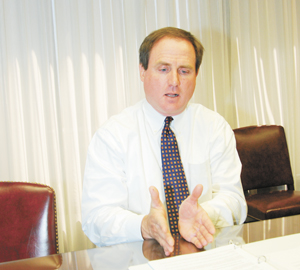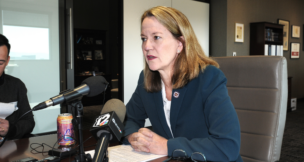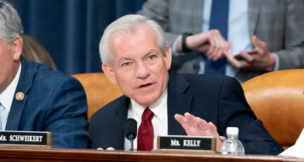UpClose with Dennis Burke
Gary Grado//September 24, 2010//[read_meter]
 Dennis Burke’s career in Arizona has come somewhat full circle. He began as an assistant U.S. attorney in 1997, working drug cases, and now he is the U.S. attorney for Arizona.
Dennis Burke’s career in Arizona has come somewhat full circle. He began as an assistant U.S. attorney in 1997, working drug cases, and now he is the U.S. attorney for Arizona.
From 1997 until the U.S. Senate confirmed him as the top federal lawman in Arizona, one of the constants in his career was Homeland Security Secretary Janet Napolitano. He worked for her when she was the U.S. attorney, he followed her to the state Attorney General’s Office to be her chief deputy, and then joined her in the Governor’s Office as her chief of staff before working for her as a senior adviser in the Department of Homeland Security’s transition from the Bush administration to the Obama administration.
Burke, 46, spent the early part of his career in Washington D.C. working for Democratic Sen. Dennis DeConcini, and in the Clinton White House. In a Sept. 7 interview with the Arizona Capitol Times, Burke discussed his law enforcement priorities, the expansion of civil rights prosecutions in his office and the investigation of Maricopa County Sheriff Joe Arpaio.
When you were appointed, what did you want your legacy to be as the U.S. attorney for Arizona and how is that shaping up so far?
There are 94 districts in the entire system, and we’re one of the largest now because of the amount of resources that went into the Southwest border. And this is without a doubt one of the most dynamic districts.
What I mean by that is we have more activity and more diversity of activity. We bring more cases out of Indian country than any other district in the country, we have more cases coming out of the Southwest border now than any other district in the entire country, and we have suffered through an epidemic of mortgage fraud and mortgage scams that impacted the entire economy of the state of Arizona, and so my priorities were set when I came into office.
Were they set by the administration or do you have some say so?
They’re set by the climate of the district you’re in. For you to go in and say you want to make something else a priority when you have an overabundance of cases coming out of Indian country, where you’ve got the Southwest border, you’ve got mortgage fraud, those are predetermined priorities. There’s no reason to come in and say I’m going to change the direction we’re going with regards to the overall pursuit of what you’re trying to achieve in the district.
Now we’ve taken a lot of steps in those particular areas, and we’ve also reached out in the area of civil rights as never before. We now have a district-wide civil rights unit that never existed in the district, we have prosecutors who focus on civil rights matters exclusively.
Under the rubric of the Southwest border, we now have what is called a Rule of Law Unit. We have eight prosecutors out of our office, our Phoenix and Tucson offices, who have prior experience working in Latin America, either practicing law or teaching or training, so we have this wealth of talent in our district and they are now working in Mexico to train prosecutors in Mexico to bring drug cases in Mexico.
Our goal is to move the border back into Mexico and not wait until a crime occurs at the border or in the United States in our district.
Can you give us some thumbnail examples of how you’ve made gains in those three areas — mortgage fraud, the border and Indian country?
Yeah, we’ve gotten a huge influx of resources from the Department of Justice under Eric Holder’s leadership in those three areas. I’ve got additional prosecutors in all those areas since I’ve come on board. It’s a simple equation when it comes to the Southwest border: You’ve got humans and drugs heading north, and you’ve got money and guns heading south. So we’re not just focusing on the guns and humans coming north; we’re focusing on the guns and the money heading south.
We’re seizing more money than we have ever before. Drug traffickers and cartels are driven by greed, and if you focus on the money you can take out their backbone.
Tell me more about the civil rights unit.
The chief is out of the Tucson office. We work very closely with the Department of Justice Civil Rights Division. We’re doing a lot of outreach. We have additional authority under federal law — under hate crimes law signed by President Obama — that gives us additional authority to go after hate crimes at the federal level.
We’re working very closely with federal agencies with regard to potential excessive-force issues, and we’re doing a lot of training with law enforcement so there’s less chance they will commit civil-rights violations, and we’re doing public outreach so people know we’re here and that someone is looking out for their civil rights and we’re bringing more cases.
When it comes to civil rights, are there actual indictments?
Part of the problem with the buildup on the border with regards to the exponential hiring of more patrol officers and other officials is the potential for civil-rights violations.
I can get for you some of the cases we’ve done recently with regards to where our office has actually prosecuted federal officials for excessive force, and we’re doing more of those and we’re doing a lot more training to make sure those don’t occur. We work very directly with the Civil Rights Division, and we’re very involved with the civil-rights investigation with regards to the Maricopa County Sheriff’s Office.
You’ve been Janet Napolitano’s right-hand man as governor and attorney general. Can you tell us a how you met her and how that professional relationship blossomed?
I knew her many, many years ago when I moved back to Arizona after I worked in D.C. for many years. I wanted to move back here and I took a position in the United States Attorney’s Office when she was U.S. attorney. I worked on drug prosecutions when she was U.S. attorney, and that was the first actual job I had with her.
You were just talking moments ago about the diversity of your office, both geographically and when it comes to law enforcement. What’s really keeping you busy these days?
I’d say some of the areas we already touched on. I’m also a member of the Attorney General’s Advisory Committee. It’s about 15 to 19 U.S. attorneys across the country who meet monthly in Washington D.C. and then speak numerous times in between. We help to design and review the policies of the department as they impact U.S. attorneys. We’re the voice of U.S. attorneys.
I’m also the chair of the Southwest Border Committee, so I’m spending a lot of time now on southbound firearms and money and the cases and investigations we’re working on. We spend a lot of time with our counterparts in Mexico. We’re doing more joint investigations with Mexico than we’ve ever done in the past. Our ability to gather intelligence and work in a coordinated manner with Mexican law enforcement is unprecedented.
How is it going, working with Mexico?
Very well. I mean, there’s always issues we have to deal with. There’s a history and there continues to be a fair amount of corruption in (Mexican) law enforcement, but at the same time, we’ve made immense progress.
I’ve traveled to Mexico City, I’ve met with the highest levels of PGR (Procuraduria General del la Republica), which is our counterpart, which is the Department of Justice for the Republic of Mexico. I meet on a regular basis and keep in regular communication with my counterpart, effectively the U.S attorney for the Sonoran Region for the PGR of Mexico. We’ve got prosecutors going down to Mexico on a regular basis getting intel, working on joint investigations. That just didn’t occur before.
And they’re picking up cases that for whatever reason you can’t prosecute here, right?
Yes. We’ve got port-of-entry cases at the Nogales port of entry where, because of the law in the 9th Circuit, we’ll have to decline because we can’t prove knowledge of the individual who is in the vehicle, that he knew the drugs were there and it’s not his car.
We’re now jointly working with the PGR and giving those cases back to them, and they’re pursuing them under Mexican law and they’re prosecuting them and it’s having an impact. We know it’s having an impact because the most recent couriers and drivers of these cars no longer come from the Nogales area. They are coming from Obregon, which means the word got out among couriers, “Hey man, it’s no longer a free ride. You’re going to get busted, and you’re going to get convicted in Mexico.”
On your website, it goes into border security and you testified before Congress about it. Is there any focus given to . . .
Beheadings?
Preventing terrorism?
Yeah, I’ve increased the size of our national security section here at the U.S. Attorney’s Office. I combined our top immigration border security prosecutors and our best firearms prosecutors, and they are now in our national security section.
Arizona has a history of individuals who were involved in terrorism and not having anything to do with the border, but those experts in our office who work very closely with the FBI are now combined in with our border security experts on immigration and firearms, and they all work together in one unit so they can share ideas, intel information and work kind of together so we have a sense of national security — not just from potential terrorist case, but also with regards to what’s going on with our border and what’s coming across.
What’s the status of the Arpaio investigation?
We filed a complaint in court (a few weeks ago). We filed that because it is our position that the Sheriff’s Office has not only been recalcitrant but has been ignoring their obligations under federal law to provide documents in response to request by the department, and they have an obligation because they are a recipient of federal funds.
They’ve set their own rules. They believe they should be treated differently than any other law enforcement agency in the country or in history because they have put up roadblocks and resistance like no other agency has.
You’ve stated your thoughts on SB1070 Very strongly. Unconstitutional, unfunded, unworkable, it’s overall confusing, it was poorly drafted.
Can you give us your best educated guess on how it’s going to resolve.
Our position is the ruling at the district court was very solid and it will hold up before the 9th Circuit. We’re very confident about the arguments we’ve made.
We think it’s important because it has caused a lot of confusion. At the end of the day this isn’t about whether state and local law enforcement can have a role in border security and immigration; they do every day. We work joint task forces on a regular basis with state and local law enforcement. What’s different about 1070 is it’s poorly written, it would create a patchwork system for immigration across the country.
One of the arguments of the proponents of 1070 is that the federal government failed in its duties to patrol the border and control immigration. Why shouldn’t states be able to take some control of their problems?
Well, they do play a role, as I said earlier. I don’t think the standard is failure, therefore you get to overtake them. I mean, if that were the case we’d be able to take over the Arizona Legislature because they’ve been a failure under that logic.
I’ll add to that. We need comprehensive immigration reform, the federal government needs to move on that, but we made considerable progress with regards to resources and attention to focus on the border. The number of people crossing on any given day is a third or a quarter of what it was just a couple of years ago.
I’ll be the first to say the federal government attention toward this in the past has been extremely inadequate, and as a former state official I saw it very up close. But progress has been made. And passing one state law that is, by the way, unfunded, very confusing and most importantly unconstitutional is not the answer.
You’ve worked for Janet Napolitano, Dennis DeConcini, you’ve worked in the White House — do you have any political aspirations of your own, getting elected to office?
No. This job is the opportunity of a lifetime, but I would say without a doubt it is one of the most challenging U.S. attorney positions in the country, but not the most challenging. All I’m thinking about is making this office as successful as possible so there are no other thoughts about anything else at this point.
UpCloser
Which is rougher, politics in Arizona or Washington D.C.?
It’s a blood sport in DC. That said, when I was there, staffers of all political stripes never shied from socializing with one another. There was a way to compartmentalize what you did for a living. You are seeing less of that in Arizona, which is troubling. Overall, the whole tenor of political debate in this country is uglier, nastier and more personal than it once was not too long ago. And, that is sad.
You commented that you wanted this interview outside your office because a previous UpClose subject was asked about things in his office. Tell us about at least one memento in your office.
Many family pictures, including one of my grandfather who came from poverty-stricken Ireland around the turn of the century to America as a teen with the hope of living a better life and raising a family. His sacrifice drove my father to work hard and appreciate this country and now drives me as well.
You’ve mentioned in previous interviews you golf and enjoy reading. What was your last score and the last book you read?
Hover around a nine handicap, not the least helped by the workload of this job. I am reading “The History of Mexico” by Burton Kirkwood.
You’ve worked behind the scenes in politics and worked in law enforcement as a prosecutor, describe the fulfillment you get from each?
I have spent my entire career in public service. I respect and appreciate the responsibilities and relish the challenges. I have many opportunities of a lifetime through my service and I am very grateful for the privilege to serve. We grant prosecutors immense authority to the obvious point where it impacts the liberties of so many individuals. I have seen abuses of that power and how it has eroded public confidence in its application. I think about that every day and work to insure that power granted is not power abused. There are many ways prosecutors can work to improve our criminal justice system, thereby lessening crime while advancing the quality of life of our community. And, I strive to focus on those aspects of the job.











